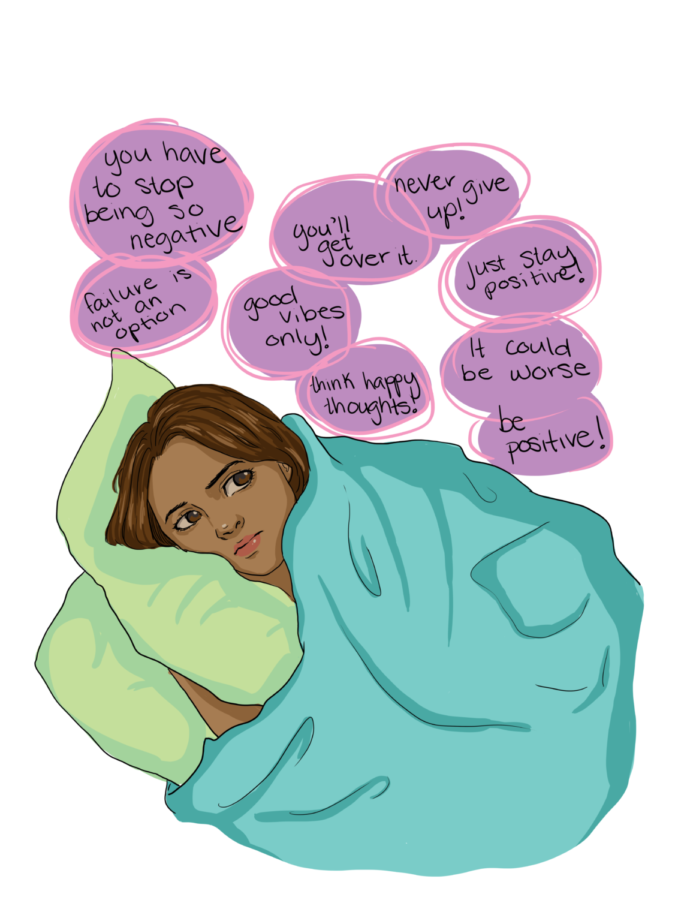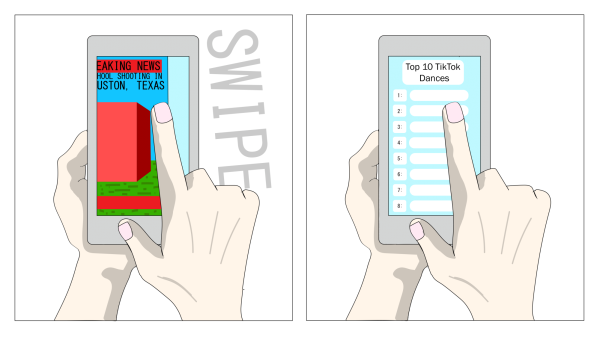Toxic smiles
photo by Caitlyn Hale
Although being positive seems good, there is a certain point where this positivity becomes bad. When the positivity given shows a lack of empathy and does not recognize being sad or upset, it becomes what is known as toxic positivity.
“Think happy thoughts.”
This phrase is a common thing to say to a friend who is upset, but behind that positive quote and big smile is something darker—toxic positivity.
Toxic positivity is when someone responds to negative thoughts with a lack of validation and support, instead masking their words with positivity. Those participating in toxic positivity tend to exhibit little empathy and provide false reassurance that only makes the “negative” person feel worse. For example, saying that “failure is not an option” or “you will get over it soon.” In other words, toxic positivity is a form of gaslighting.
Even expressing that people should have “good vibes only” is not a form of positivity—it is an example of toxic positivity. People need to be very cautious of how they cope or help others cope with negative thoughts and feelings.
In 2020, a survey done by the Science of People showed that the number of people who said they had dealt with toxic positivity in one week was about 67.8%. Considering that more than half of these people have experienced the downsides of toxic positivity, people should really take the time to think about whether what they say will have a positive or negative impact on others.
The dangers of toxic positivity
One of the most dangerous aspects of toxic positivity is its dismissal of significant problems by things such as ‘feel good’ quotes. When all forms of negativity are ignored it can cause a feeling of shame, potentially damage personal and interpersonal relationships and suppress emotions.
Shame can be a result of toxic positivity because a person may end up feeling like they are a drag if they express how they truly feel, or shameful for even feeling like that in the first place.
Relationships can be damaged because the lack of empathy or real advice toward one’s feelings could lead people to believe that the person does not really care. It can also impact personal relationships because it can cause people to get upset with themselves for feeling this way, and it ties in with the feeling of shame.
Piled on to the damaged relationships and shame, people will begin to suppress their emotions– feeling like their feelings are being invalidated. As a result of all of this, people may suffer mentally. An example of this is if a person expressed they have been struggling with school and someone just said, “You will get over it.” This could damage their relationship because they may feel this person does not really care and stop expressing problems they may be struggling with to this person.
Although it is good to be positive, when it comes to people being upset, it is important to be attentive to them and empathize with them. This way they know their feelings are valid and they have the support of others when they need it. People should not have to suffer and isolate themselves because they feel like no one cares, people who are asked for help should provide the right type of positive support these people need or at least not leave them feeling worse.
How to stop toxic positivity
The first step to healing the impact of toxic positivity is to recognize that feeling negative sometimes is normal and allowed. It is important that people realize not everyone has to be happy all the time; some days people may be going through something or feeling down and the way they feel is acceptable. Normalizing that sadness and being angry is important because by normalizing it we do not feel the need to mask it with fake positivity.
Among the other steps to stop toxic positivity is to stop saying popular ‘feel good’ quotes. Some of these popular quotes include: “good vibes only,” “you’ll get over it,” “other people have it a lot worse,” and “things could be way worse.”
Even the saying “It will be fine,” does not address how the other person is feeling. A simple saying, even one this common, acts as if there is no real problem and the person should be positive.
While these feel-good quotes may seem like nice ways to help people cope, they actually do the exact opposite. Toxic positivity takes root in some of these common “positive” quotes and can be what causes people to suppress their emotions and be ashamed in the face of negative emotions.
Some ways to avoid being a victim or attacker of these toxic quotes is to reword them in ways that still show acceptance and support to the way someone is feeling. Things like “other people have it a lot worse” can be reworded to things like “you are not alone, and there is support to help you.” By rewording these things, people know it is okay to feel sad and they know they have help to get through it.
The myth that positivity in any form is good needs to be debunked sooner rather than later. People need to understand that someone does not have to be positive all the time and that they are allowed to feel upset. Along with that, people should help get others through it in better healthier ways that do not disregard their emotions. Toxicity is considered unacceptable in any form, so why should toxic positivity be the exception?
Your donation will support the student journalists of Hagerty High School. We are an ad-free publication, and your contribution helps us publish six issues of the BluePrint and cover our annual website hosting costs. Thank you so much!












